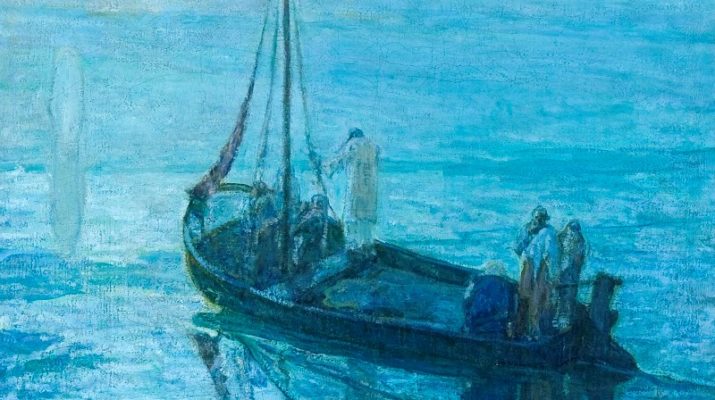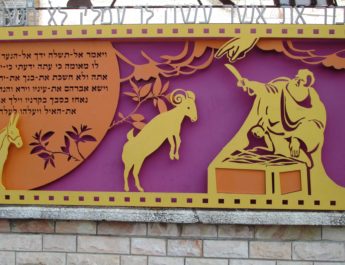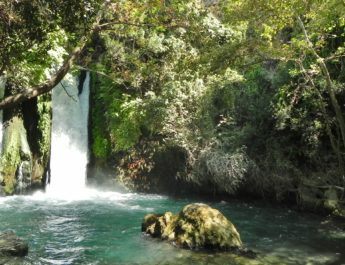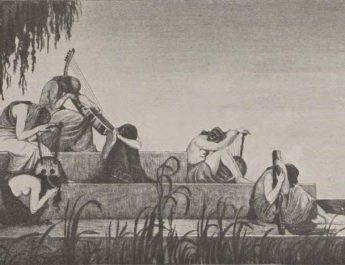John 6:14-20
A Women’s Lectionary 34
14 When the peopleA sawB the signC that he had done,D
A “people” = anthropos. Probably from aner (man, male, husband) + ops (eye, face); {from optanomai (to appear, be seen); perhaps from horao (become, seem, appear)}. This is human, humankind. Used for all genders.
B “saw” = horao. Related to “people” in v14. See note A above.
C “sign” = semeion. From the same as semaino (to give a sign, signify, indicate, make known); from sema (a sign or mark). It is literally a sign of any kind. It also refers to a sign given by God to confirm or authenticate a message or prophecy. It is not necessarily miraculous, but it can be. The Gospel of John generally uses this word instead of miracle.
D “done” = poieo. This is to make, do, act, construct, abide, or cause.
they began to say, “This is indeedE the prophetF who is to comeG into the world.”H
E “indeed” = alethos. 18x in NT. From alethes (true, unconcealed; true because it is in concert with fact and reality – attested. Literally, what cannot be hidden; truth stands up to test and scrutiny and is undeniable, authentic); from a (not) + lanthano (concealed, hidden, unnoticed; to shut one’s eyes to, unwittingly, unawares). This is truly, really, surely, truthfully, indeed. Properly, this is saying “in accordance with fact…” – what one is about to say can be proven and is true to reality.
F “prophet” = prophetes. From pro (before, in front of, earlier than) + phemi (to declare, say, use contrasts in speaking to shed light on one point of view); {from phao (to shine) or phaino (to bring light, cause to appear, shine, become visible or clear)}. This is a prophet or poet – one who speaks with inspiration from God.
G “come” = erchomai. This is to come or go.
H “world” = kosmos. Perhaps from the base of komizo (to carry, convey, recover); from komeo (to take care of). This is order, the world, the universe, including its inhabitants. Literally, this is something that is ordered so it can refer to all creation. It can also refer to decoration in the sense that something is better ordered and, thus, made more beautiful. This is where “cosmos” and “cosmetics” come from.
15 When JesusI realizedJ that they were about toK come and take him by forceL
I “Jesus” = Iesous. From Hebrew Yehoshua (Joshua, the Lord is salvation); {from YHVH (proper name of the God of Israel; the self-existent and eternal one); {from havah (to become) or from hayah (to come to pass, become, be)} + yasha (to deliver, defend, help, preserve, rescue; properly, to be open, wide or free, which implies being safe. So, in a causative sense, this is to free someone)}. This is Jesus or Joshua in Greek – the Lord saves or the Lord is salvation.
J “realized” = ginosko. This is to know, recognize, realize, perceive, learn. It is knowledge gained through personal experience.
K “were about to” = mello. Perhaps from melo (something that one is worried or concerned about, something one pays attention to or thinks about). Properly, this is ready, about to happen, to intend, delay, or linger. This is just on the point of acting.
L “take…by force” = harpazo. 14x in NT. Perhaps from haireomai (to choose, take); probably related to airo (raise, take up, lift, remove). This is to grab with force, seize, pluck, get through robbery, snatch up. This is taking something openly and violently – not subtly or in secret.
to makeM him king,N he withdrewO again to the mountainP byQ himself.
M “make” = poieo. Same as “done” in v14. See note D above.
N “king” = basileus. Probably from basis (step, hence foot; a pace); from baino (to walk, to go). This is king, emperor, or sovereign.
O “withdrew” = anachoreo. 14x in NT. From ana (up, again, back, among, anew) + choreo (to make space, receive, have room for, progress, depart so as to make room; figuratively, living open-heartedly); {from choros (a particular space or place); from chora (space, land, region, fields, open area); from chasma (gap, gulf, chasm, open space); from chasko (to gape, yawn)}. This is to withdraw, depart, retire, or leave. It can give a sense of seeking safety from harm or of retiring.
P “mountain” = oros. Related to “take…by force” in v15. Perhaps from oro (to rise); perhaps akin to airo (see note L above). This is mountain or hill.
Q “by” = monos. Perhaps from meno (to stay, abide, wait, endure). This is alone, single, remaining, mere, desolate.
16 When eveningR came,S his disciplesT went downU to the sea,V
R “evening” = opsios. 15x in NT. From opse (after, late, in the end, in the evening); from opiso (back, behind, after); from the same as opisthen (after, back, from the rear); probably from opis (back). This is afternoon, evening, nightfall, or late.
S “came” = ginomai. This is to come into being, to happen, become, be born. It can be to emerge from one state or condition to another or is coming into being with the sense of movement or growth.
T “disciples” = mathetes. From matheteuo (to make a disciple of); from manthano (to learn key facts, gain knowledge from experience; generally implies reflection as part of the learning process); from math– (thinking things through). This is a disciple, learner, or student. It is where we get “mathematics” from.
U “went down” = katabaino. Related to “king” in v15. From kata (down, against, throughout, among) + baino (see note N above). This is to come down whether from the sky to the ground or from higher ground to lower. It can be used in a literal or figurative sense.
V “sea” = thalassa. Perhaps from hals (sea, salt, a boy of saltwater) or halas (salt; can be figurative for prudence). This is the sea, a lake, or seashore.
17 gotW into a boat,X and startedY across the sea to Capernaum.Z
W “got” = embaino. Related to “king” in v15 & “went down” in v16. 17x in NT. From en (in, on, at, by, with) + baino (see note N above). This is to step onto – embark on a boat.
X “boat” = ploion. From pleo (to sail, voyage); probably from pluno (to plunge – so to wash); from pluo (to flow). This is a boat, ship, or vessel.
Y “started” = erchomai. Same as “come” in v14. See note G above.
Z “Capernaum” = Kapernaoum. 16x in NT. From Hebrew kaphar (village with walls); {from the same as kephir (a young lion, village); from kaphar (to appease, cover, pacify, cancel)} + Nachum (Nahum, “comfortable”); {from nacham (a strong breath or sigh; to be sorry, to pity, console, comfort, or repent; also to comfort oneself with thoughts of vengeance)}. This is Capernaum, meaning “Nahum’s village.”
It wasAA now dark,BB and Jesus had not yet comeCC to them.
AA “was” = ginomai. Same as “came” in v16. See note S above.
BB “dark” = skotia. 16x in NT. From skotos (darkness literal or figurative – as moral or spiritual darkness, sin and what comes from it; obscurity); from skia (shadow, thick darkness, outline; figurative for a spiritual situation that is good or bad). This is darkness or dimness. Figuratively, it can be a spiritual darkness. This is obscurity in a literal or figurative sense.
CC “come” = erchomai. Same as “come” in v14. See note G above.
18 The sea became roughDD because a strongEE windFF was blowing.GG
DD “became rough” = diegeiro. 6x in NT. From dia (through, for the sake of, across, thoroughly) + egeiro (o awake, raise up or lift up; to get up from sitting or lying down, to get up from sleeping, to rise from a disease or from death; figuratively, rising from inactivity or from ruins); {from ageiro (to gather)}. This is to wake up completely, awake, stir up, arouse – literal or figurative.
EE “strong” = megas. This is big in a literal or figurative sense – great, large, exceeding, abundant, high, mighty, perfect, strong, etc.
FF “wind” = anemos. From aer (air that we breathe); from aemi (to breathe or blow). This is wind or a gust of air. It can also be used figuratively for empty doctrines.
GG “blowing” = pneo. 7x in NT. This is to breathe or to blow as a breeze.
19 When they had rowedHH about three or four miles,II they sawJJ Jesus
HH “rowed” = elauno. 5x in NT. This is to propel or carry – to drive forward with oars or like the wind does. It can also refer to being driven by a demon.
II “three or four miles” = stadion + eikosi + pente + e + triakonta. Literally, “stadia, 25 or 30.” Stadion is 7x in NT. From the same as histemi (to stand, place, establish, appoint, stand ready, be steadfast). This is a stadium, which was a unit of length. By implication, this would refer to a racing track for a foot race. Eikosi is 11x in NT. It is twenty. Pente is five. Triakonta is 11x in NT. From treis (three). This is thirty.
JJ “saw” = theoreo. From theaomai (to behold, look upon, see, contemplate, visit); from thaomai (to gaze at a spectacle; to look at or contemplate as a spectator; to interpret something in efforts to grasp its significance); from theoros (a spectator or envoy). This is gazing, beholding, experiencing, discerning. It is looking at something to analyze it and concentrate on what it means. This is the root of the word “theatre” in that people concentrate on the action of the play to understand its meaning.
walkingKK on the sea and comingLL nearMM the boat, and they were terrified.NN
20 But he said to them, “It is I; do not be afraid.”OO
KK “walking” = peripateo. From peri (about, concerning, around, encompassing) + pateo (to read, trample on; to trample literally or figuratively); {from patos (trodden) OR from paio (to strike, smite, sting; a hit like a single blow)}. This is to walk. Going from Hebrew figurative language, to walk referred to how you conducted your life, how you chose to live. This word is most literally walking around. Figuratively, it is living, behaving, following, how you occupy yourself. This is where “peripatetic” comes from.
LL “coming” = ginomai. Same as “came” in v16. See note S above.
MM “near” = eggus. Perhaps from agcho (to squeeze). This is nearby or near in time.
NN “were terrified” = phobeo. From phobos (panic flight, fear, fear being caused, terror, alarm, that which causes fear, reverence, respect); from phebomai (to flee, withdraw, be put to flight). This is also to put to flight, terrify, frighten, dread, reverence, to withdraw or avoid. It is sometimes used in a positive sense to mean the fear of the Lord, echoing Old Testament language. More commonly, it is fear of following God’s path. This is where the word phobia comes from.
OO “be afraid” = phobeo. Same as “were terrified” = in v19. See note NN above.
Image credit: “The Disciples See Christ Walking on the Water” by Henry Ossawa Tanner, c. 1907.




